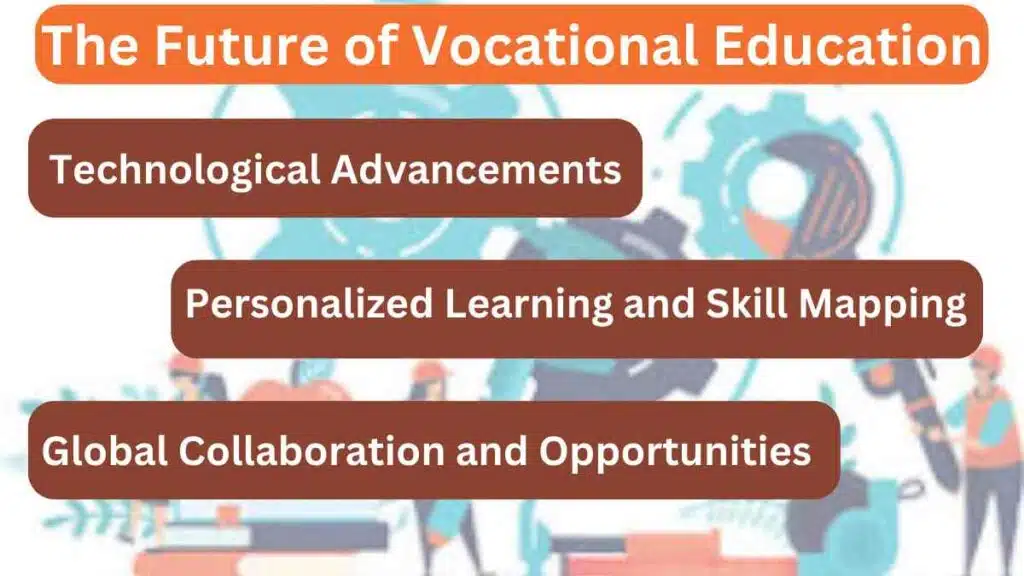The Future of Vocational Education
The future of vocational education is bright and promising with technology playing a significant role in its transformation. The need for qualified workers will only grow as companies continue to develop, making vocational education a crucial component of our educational system.
Vocational education will give people the skills they need to succeed in their employment. It makes a significant contribution to society by embracing technology improvements, emphasizing soft skills, and closing the skills gap.
What is Vocational Education?
Vocational education is often referred to as career and technical education (CTE). It encompasses a wide array of courses and training programs that prepare individuals for jobs requiring practical skills. These programs are designed to cater to specific industries such as healthcare, technology, manufacturing, automotive, hospitality, and more.
Unlike conventional degrees, vocational education emphasizes hands-on experience and training, enabling learners to gain expertise in their chosen fields.
The Importance of Vocational Education
Vocational education plays a crucial role in meeting the demands of industries and the labor market. As the job landscape evolves, employers seek candidates with specialized skills and competencies that can immediately contribute to their businesses.
Vocational education bridges the gap between classroom learning and real-world application, producing job-ready professionals. It offers an alternative pathway for students who may not be inclined toward traditional academia but possess practical talents and interests.
Challenges in Vocational Education
While vocational education has numerous advantages, it also faces certain challenges that need to be addressed for its successful integration into the education system.
Lack of Awareness and Perception
One of the primary challenges is the lack of awareness among students and parents about the potential benefits of vocational education. There is often a perception that academic degrees hold higher value, leading many to overlook vocational pathways.
Funding and Resource Constraints
Insufficient funding and resources can limit the expansion and development of vocational education programs. The cost of modern equipment and infrastructure required for technical training can be substantial, posing a hindrance to institutions.
Integration with Traditional Education
Integrating vocational education with conventional academic curricula remains a challenge. Striking a balance between both streams of education is vital to ensure students have a comprehensive learning experience.
Changing Industry Needs
Industries are constantly evolving, and their requirements for skilled professionals change accordingly. Vocational education must stay updated and aligned with the latest industry trends to remain relevant.
The Future of Vocational Education
Despite the challenges, the future of vocational education looks promising as it embraces technological advancements and adapts to the changing dynamics of the job market.

Technological Advancements
Technology will revolutionize vocational education, enabling interactive and immersive learning experiences. Virtual simulations and augmented reality will provide students with practical training in a safe and controlled environment.
Personalized Learning and Skill Mapping
Advancements in artificial intelligence and data analytics will facilitate personalized learning paths for students. Skill mapping will help identify individual strengths and weaknesses, guiding students toward suitable vocational courses.
Global Collaboration and Opportunities
Vocational education will transcend geographical boundaries through online platforms, connecting learners with global opportunities and collaborations. Students can access courses and training programs from institutions worldwide.
Emphasis on Soft Skills
While technical skills are essential, the future of vocational education will also prioritize soft skills development. Effective communication, problem-solving, teamwork, and adaptability will be integral to producing well-rounded professionals.
Government Initiatives and Support
To bolster vocational education, governments worldwide are implementing various initiatives and support systems. Financial aid, partnerships with industries, and policy reforms are being introduced to encourage the growth of vocational education.
Upskilling and Reskilling for Career Growth
As industries rapidly evolve, upskilling and reskilling will become vital for professionals to remain relevant in their fields. Vocational education will play a pivotal role in providing avenues for continuous skill development.
Vocational Education and Job Market Trends
The job market will see an increased demand for skilled workers in various industries. Vocational education will cater to these specific needs, creating a well-prepared and job-ready workforce.
The Role of Industries and Employers
Industries and employers will collaborate with vocational education institutions to design curricula that align with industry needs. This partnership will result in a workforce better equipped to meet industry expectations.
Bridging the Skills Gap
Vocational education will address the existing skills gap by training individuals for in-demand jobs. This will contribute to reducing unemployment rates and boosting economic growth.
Advantages of Vocational Education
The advantages of vocational education are diverse and encompass various aspects, such as practical learning, employability, and entrepreneurship opportunities.
Overcoming Stigmas and Stereotypes
Society’s perceptions of vocational education often lag behind its reality. Overcoming stigmas and stereotypes associated with vocational education will be crucial to its growth and acceptance.
Inclusivity and Accessibility
Ensuring that vocational education is accessible to all individuals, regardless of their backgrounds, is vital for promoting inclusivity and diversity in the workforce.
A Holistic Approach to Education
Vocational education will complement traditional academic pathways, offering students a more comprehensive and diversified range of educational choices.



Leave a Reply